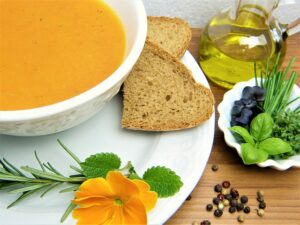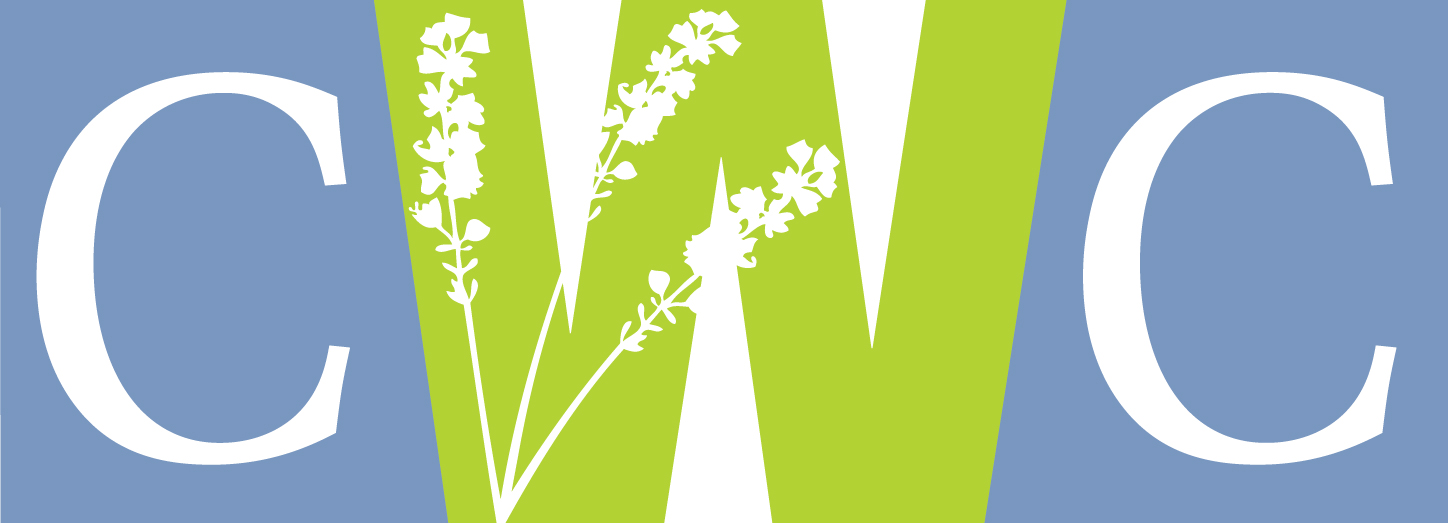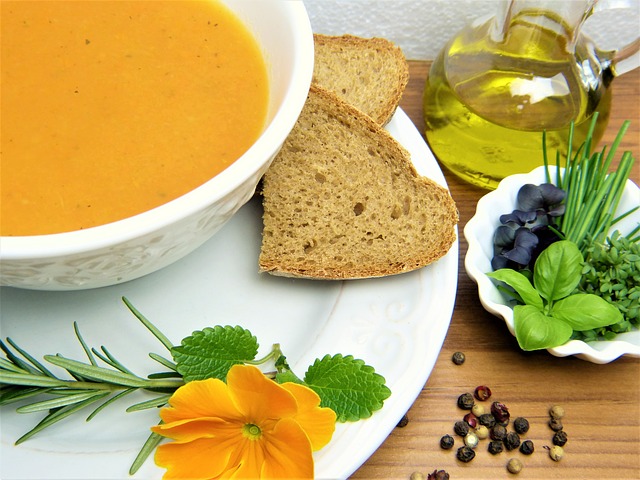
A breakdown in immune health can open the door to a wide variety of health problems. Supporting the immune system with diet and healthy practices is our body’s best defense. If the immune system is not operating optimally, not only can the body’s ability to fight illness and infection be compromised, but the body can also misinterpret healthy cells for invaders and begin to attack itself.
As important as it is to eat the right foods, what you avoid eating can be just as important. The obvious food to avoid or eat minimally can deplete or block absorption of the good nutrients. They include alcohol, caffeine, sugar, excess fats, and highly processed foods. There are some key nutrients that help support immune functions because of their protective qualities and the roles they play in building a healthy body. These include vitamins, minerals, the amino acids including alanine, arginine, cysteine, lysine and threonine (found in protein food sources) and the fatty acids: linoleic acid and linolenic acid (found in nuts seeds and their oils). The things to know about each nutrient are outlined below.
Nutrients That Support Immune Health
Vitamin A
Found in two forms, provitamin A and beta carotene.
Provitamin A is a fat-soluble vitamin found in animal sources such as egg yolks, beef liver, cod liver oil and salmon. It is important for healthy eyes.
Beta carotene is found in vegetable sources and converted to vitamin A in the body. A larger portion of vitamin A should be consumed in this form as it is less toxic to the body than the provitamin sources. Excellent sources of this form are carrots, sweet potato, red peppers, squash, spinach, cantaloupe, pink grapefruit, kale, broccoli, romaine and Boston lettuce and dandelion, mustard, turnip, and beet greens.
Recommended intakes: 15,000 mg daily, 30,000 mg of beta carotene is converted to 15,000 of vitamin A in the body.
B Vitamins
B vitamins are most often found together in perfect balance but often lost in processing. They are water soluble vitamins, so the body expels what it does not use.
It is wise to supplement these vitamins together in a B Stress Complex as there is a desirable amount and balance of the B vitamins in these formulas.
Vitamin B2 (riboflavin)
Found in mushrooms, *cottage and feta cheeses, *yogurt, pork and pollock. People with a low functioning thyroid need more.
B5 (pantothenic acid)
Found in mushrooms, sweet potato, acorn squash, peas, avocado and broccoli (raw).
B6 (pyridoxine)
Found in peppers (red, hot chili and green), spinach, bananas, acorn squash, pork, haddock, salmon.
B12 (cobalamin)
Found in seafood, clams, mussels, crab, sardines, beef, and *yogurt. Vitamin C can block absorption so excess vitamin C should be taken separately. Alcohol, caffeine, laxatives, and tobacco can deplete.
Folic Acid (folate)
Found in asparagus, spinach, turnip greens, broccoli, artichokes, beets, beans (pink, black or kidney), red bell peppers.
Vitamin C
Found in red, yellow, green bell peppers (raw), chili peppers, guava, papaya, strawberries, broccoli (raw), kale and oranges. Aging, allergies, diabetes, taking aspirin, antibiotics or birth control pills deplete vitamin C.
Vitamin E
Found in red pepper, blackberries, avocado, asparagus, sunflower seeds (dried), almonds (dried), almond butter, spinach, and greens (dandelion, beets, and turnip). Cooking, storing, and freezing reduces amount of vitamin E in food.
Recommended intake is 200 IU per day. Take more Vitamin E when the intake of fatty acids is high.
Calcium
Found in salmon (pink, canned), cactus, sardines, Chinese cabbage, Bok choy (cooked), kale, seaweed (kelp, raw.)
Recommended intake: 1,000 -1,200 mg per day, between meals or at bedtime.
Take with adequate vitamin A, vitamin D and magnesium.
Take in moderate amounts of protein and fats as they decrease absorption of calcium.
Copper
Found in mushrooms (shitake, dried or cooked), oysters, blue crab, raw cashews, avocado, spinach (cooked), asparagus(cooked), blackberries¸ guava and hummus.
Recommended intake: 3,000 mcg per day, balance with 24mg of zinc
Excess manganese and zinc interfere with the absorption of copper.
It is best not to supplement as an excess can be toxic and have a detrimental effect on the immune system.
Iron
Found in clams, oysters, beef, asparagus, mushrooms, tuna, eggs, turkey, and sardines. Vitamin C, copper, cobalt, manganese, increase iron absorption.
Do not take iron supplements unless prescribed by a doctor.
*Iodine
Found in seaweed and seafood.
Recommended intake: 150 mcg (RDA)
Magnesium
Found in spinach (cooked), acorn squash, artichokes, Brazil nuts, sunflower seeds, pumpkin, and squash seeds (dried).
Recommended intake: 750 mg watch intake in the presence of kidney disease. Take in a 2:1 calcium to magnesium ratio.
Alcohol, diuretics, birth control pills, caffeine and sugar deplete magnesium.
Manganese
Found in brown rice, egg yolks, and walnuts
Recommended intake: 6-8 mg
Selenium
Found in Brazil nuts (dried), oysters, tuna (canned), blue crab, and clams.
Recommended intake:100 mcg (take no more than 200 mcg in supplement form).
Works together with vitamin E
Zinc
Found in beef, turkey, shrimp, crab, oysters, and oats.
Recommended intake: 24 mg daily. Animal sources of zinc are better absorbed by the body than plant sources.
Excess sweating, surgery, alcohol, and stress deplete zinc in our bodies.
The following are rich sources of multiple nutrients that support a healthy immune system:
| Almond (dried) 14 nuts | Asparagus 1 cup (cooked) | Beef (broiled) |
| Beet Greens | Bok Choy (cooked) | Blackberries (raw) |
| Broccoli | Cabbage Chinese | Carrots (raw) |
| Dandelion Greens | Grapefruit (pink and red) | Haddock |
| Hummus (1/4 cup) | Kale (1/2 cup raw) | Lentils (cooked) or sprouted (raw) |
| Mushroom pieces (cooked) | Peas Pods (edible) | Red Pepper 1 ½ c (raw) |
| Onions (cooked) | Mushroom -shitake (dried) | Mustard greens |
| Pollock/ walleye (dry heat) | Pork center loin (roasted) | Potato, with skin (baked) |
| Potato Sweet (baked) | Pumpkin or Squash Seeds | Salmon (dry heat) |
| Shrimp | Squash (butternut) | Tuna (light, canned in water) |
| Turkey (roasted) | Walnuts, English (dried) | Wheat Germ (raw) |
Educating yourself is a good defense. An effective way to know what you are eating is to read labels. Foods with ingredients that you recognize, and foods with the fewest ingredients are your cleanest options.
It is best to consume fruits and vegetables that are in season. Fresh and organic are best as they are lower in toxins, followed by organic, or frozen. Often, the frozen varieties are picked at their peak of ripeness and flash frozen at the source, which make them more nutrient dense, with higher levels of vitamins, minerals, and antioxidants. Antioxidants are nature’s defenders against illness, and a strong tool in supporting immune health.
*food sources that may not be suitable for those with certain health concerns and may exacerbate imbalances or certain conditions.
If you have any questions or comments about this topic or would like a nutrition assessment, please contact us.
Be your best health!
Jill,
Certified Nutritional Counselor, Lifestyle Educator and Eating Psychology Coach






